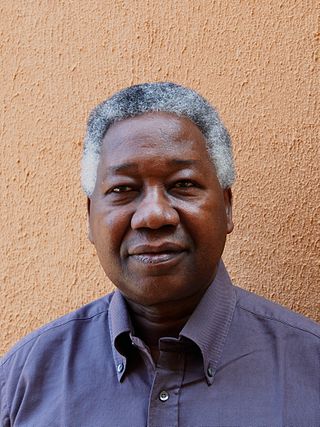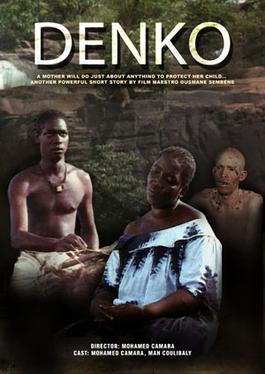Related Research Articles

Algeria, officially the People's Democratic Republic of Algeria, is a country in North Africa. Algeria is bordered to the northeast by Tunisia; to the east by Libya; to the southeast by Niger; to the southwest by Mali, Mauritania, and Western Sahara; to the west by Morocco; and to the north by the Mediterranean Sea. It is considered part of the Maghreb region of North Africa. It has a semi-arid geography, with most of the population living in the fertile north and the Sahara dominating the geography of the south. Algeria covers an area of 2,381,741 square kilometres (919,595 sq mi), making it the world's tenth largest nation by area, and the largest nation in Africa, being more than 200 times as large as the smallest country in the continent, The Gambia. With a population of 44 million, Algeria is the ninth-most populous country in Africa, and the 32nd-most populous country in the world. The capital and largest city is Algiers, located in the far north on the Mediterranean coast.

Casablanca, also known in Arabic as Dar al-Bayda is the largest city in Morocco and the country's economic and business center. Located on the Atlantic coast of the Chaouia plain in the central-western part of Morocco, the city has a population of about 3.71 million in the urban area, and over 4.27 million in the Greater Casablanca, making it the most populous city in the Maghreb region, and the eighth-largest in the Arab world.
Attitudes toward lesbian, gay, bisexual, and transgender (LGBT) people and their experiences in the Muslim world have been influenced by its religious, legal, social, political, and cultural history. The Quran narrates the story of the "people of Lot" destroyed by the wrath of God because the men engaged in lustful carnal acts between themselves, but modern historians have concluded that the Islamic prophet Muhammad never forbade homosexual relationships outright, although he disapproved of them in line with his contemporaries. At the same time, "both the Quran and the hadith strongly condemn homosexual activity"; with some hadith prescribing the death penalty for those engaged in male homosexual intercourse.

Gaston Kaboré is a Burkinabé film director and an important figure in Burkina Faso's film industry. He has won awards for his films Wend Kuuni and Buud Yam.

Mohamed "Mo" Camara is a Guinean former professional footballer who played as a left-back or left midfielder.

Cinema of Africa is both the history and present of the making or screening of films on the African continent, and also refers to the persons involved in this form of audiovisual culture. It dates back to the early 20th century, when film reels were the primary cinematic technology in use. During the colonial era, African life was shown only by the work of white, colonial, Western filmmakers, who depicted Africans in a negative fashion, as exotic "others". As there are more than 50 countries with audiovisual traditions, there is no one single 'African cinema'. Both historically and culturally, there are major regional differences between North African and sub-Saharan cinemas, and between the cinemas of different countries.

In comics, LGBT themes are a relatively new concept, as lesbian, gay, bisexual, and transgender (LGBT) themes and characters were historically omitted from the content of comic books and their comic strip predecessors due to anti-gay censorship. LGBT existence was included only via innuendo, subtext and inference. However the practice of hiding LGBT characters in the early part of the twentieth century evolved into open inclusion in the late twentieth and early twenty-first centuries, and comics explored the challenges of coming-out, societal discrimination, and personal and romantic relationships between gay characters.

A Jihad for Love is a 2008 documentary film and was the world's first film on Islam and homosexuality. It took a total of six years to make and premiered at the Toronto International Film Festival in September 2007. It premiered at the Berlin Film Festival in 2008 as the opening documentary film for the Panorama section.

The Susu people are a Mande-speaking ethnic group living primarily in Guinea and Northwestern Sierra Leone, particularly in Kambia District. Influential in Guinea, smaller communities of Susu people are also found in the neighboring Guinea-Bissau and Senegal.

Mohamed Mohamed Mohamed Aboutrika is an Egyptian retired professional footballer who played as an attacking midfielder and a forward. He came second in the African Footballer of the Year award in 2008 after Emmanuel Adebayor, and was one of five nominees for the 2006 award, and one of the ten nominated for the 2013 award.

Dakan (Destiny) is a 1997 French/Guinean drama film written and directed by Mohamed Camara. It premiered at the Cannes Film Festival. Telling the story of two young men struggling with their love for each other, it has been described as the first West African feature film to deal with homosexuality.

Woubi Chéri is a 1998 French/Ivorian documentary that shows a few days in the life of various members of the gay and transgender community in Abidjan, Côte d'Ivoire. It is one of a very few films from Africa to deal with LGBT issues.

Mohammed Mzali was a Tunisian politician who served as Prime Minister between 1980 and 1986.
Vernon A. Rosario II is an American psychiatrist and medical historian who studies human sexuality. His recent work has focused on transgender and intersex youth, and he has served as chair of the medical advisory board for Intersex Society of North America.
Camp Boiro or Camp Mamadou Boiro is a defunct Guinean concentration camp within Conakry city. During the regime of President Ahmed Sékou Touré, thousands of political opponents were imprisoned at the camp. It has been estimated that almost 5,000 people were executed or died from torture or starvation at the camp. According to other estimates, the number of victims was ten times higher: 50,000.

Denko is a 1993 short drama film directed by Guinean film maker Mohamed Camara. The story involves incest between a mother and son. The film won the Grand Prix at the Clermont-Ferrand International Short Film Festival, the award for Best Short film at the Fribourg International Film Festival and the Golden Danzante award at the Huesca Film Festival.
Minka is a 1995 short film by Guinean director Mohamed Camara treating the controversial subject of child suicide.
Cheick Fantamady Camara was an award-winning Guinean film director. He was the director of two short films and two feature films. His 2006 film Il va pleuvoir sur Conakry won the 2007 Panafrican Film and Television Festival of Ouagadougou in Burkina Faso and the 2008 Prix Ousmane Sembène at the Khouribga African Cinema Festival in Morocco.
The Barber of the Poor Quarter is a 1982 Moroccan film directed by Mohamed Reggab and adapted from a play of the same title by Youssef Fadel. It was the director's sole feature film, and became a Moroccan cult classic. It was screened at the first edition of the National Film Festival in Rabat, where it received as a special mention and the 10th edition of the National Film Festival as part of a series on Moroccan classics. Internationally, the film was screened at Three Continents Festival in 1983, and the Berlin International Film Festival in 1982. The debts incurred for the production of his sole feature film led to Reggab being imprisoned.
Tabite or Not Tabite is a 2005 Moroccan drama film directed by Nabyl Lahlou. The film was inspired by the trial of Mohamed Tabet. Tabet's family filed a complaint to prohibit the preview of the film. Summoned to court in Rabat, the director successfully pleaded his case himself, arguing that it was his duty to make films about this period. The preview was ultimately held at the Mohamed V Theater in Rabat.
References
- ↑ Epprecht, Marc (2007-04-12). "African Masculinities: Men in Africa from the late Nineteenth Century to the Present". Postcolonial Text . 3 (1). Retrieved 2008-03-15.
- ↑ Association des trois mondes (2000). Les cinémas d'Afrique: dictionnaire (in French). KARTHALA Editions. p. 116. ISBN 2-84586-060-9.
- ↑ Armes, Roy (2006). African filmmaking: north and south of the Sahara . Indiana University Press. pp. 152. ISBN 0-253-34853-6.
- ↑ Spaas, Lieve (2000). The Francophone Film: A Struggle for Identity. Manchester University Press. p. 225. ISBN 0-7190-5861-9.
- ↑ "Dakan". Variety . Archived from the original on November 27, 2007. Retrieved 2008-03-15.
- ↑ "Awards for Mohamed Camara". Internet Movie Database . Retrieved 2008-03-15.